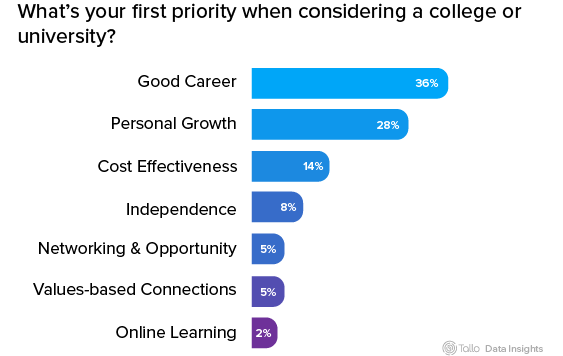
- Students are showing stronger preferences for in-person learning and work where they can be around other students, teachers, co-workers, and clients.
- Students are mostly concerned about money, cost of living, and economic instability. These concerns dominate safety and health-related issues.
- Students are willing to take on the cost of education if they believe it will ultimately lead to a higher-paying career.
Understanding what high school and college students want out of higher ed is going to once again take center stage. This is because, according to new data from the National Student Clearinghouse, American colleges and universities lost another 660,000 students in the spring semester of 2022. That’s a 5% decline over the previous year. Over the past two years, undergraduate enrollment has slumped by 10% nationally. And things aren’t slated to get any better. As a result, colleges and universities will have to do more than ever to get in front of a new generation of students. And knowing what makes those students tick is pretty key. To get a better handle on the perspective of students, we ran a survey to better understand the postsecondary educational preferences of high school and college students. Here’s what we found:
What are students’ top concerns about college?
When it comes to concerns about college, some 93% of students surveyed said that cost was the leading factor affecting their decision to either attend or pursue higher education.
Accumulating lots of debt continues to be a major concern, and this isn’t surprising considering that students have accumulated some $1.75 trillion in debt in the US to date. After that, the most common concern was about meeting people and making friends.
Only 28% of students were concerned about the relevance and value of higher ed. Across the US, most students are urged to go to college, so this makes sense. What is interesting, however, is that 40% of adults question higher ed’s value.
Of the students surveyed, 27% said that they have other work-related opportunities to pursue and going to school would limit those opportunities, while 22% have general concerns about college being disrupted. This is likely due to the fact that much of their educational experience over the past two years has been characterized by disruption and they are eager to avoid a repeat.
Here are the options and a visual of the responses
- Cost. I don’t want a lot of debt.
- Relevance and value. I still have doubts about what to pursue and am concerned about higher ed’s ability to help given the cost.
- Reliability and autonomy. I’ve spent the past two years in a highly disrupted, very difficult learning environment and am afraid of going through that again. I just want to be able to go to class without a lot of extra compliance.
- Connection. I am concerned about trying to make new friends, meeting new people, especially after the past couple of years.
- Safety. I am afraid of getting sick or being in an unsafe environment.
- Opportunity. I have other work-related opportunities or other things in my life that I am interested in pursuing. Going to school would limit those opportunities.
- Time. I’m afraid I won’t have the time because I need to work or support my family.
- Nothing. I don’t have any concerns about college.

What type of college or university appeals to you?
When it comes to the type of school students are drawn to, 58% said they would prefer a state school that balances prestige with a reasonable price, compared to 39% who said they’d prefer an elite, well-known university with a stronger brand recognition. The second most preferred education option was a smaller four-year university (47%). Only 21% of students said that they would prefer a community college.
The lowest preference in this survey was for online learning. Only 10% of students said they would prefer an online-only institution. It appears that many students would prefer to focus on higher ed in a higher ed setting rather than have the flexibility of learning online and pursuing other things.
Here are the options we presented:
- An elite, well-known university because the brand will help me build connections and a good resume.
- A community college or trade school that is close to home that will help me balance life, work, and learning.
- A state school that balances prestige with a good price. Not too far from home. But just far enough.
- A smaller 4-year university that won’t be so large and overwhelming. Better student to teacher ratio.
- An online learning provider that will provide a good education, but also allow me time to pursue other things.

What type of program or learning are you most interested in?
For many students, the primary benefit of a college education is the promise of a better career. Most students (60%) would prefer to study in a program that is more applied and career-specific. This also relates back to their concerns about cost and debt. If students attend college on loan, the incentive increases to find a good career that will help them pay their loans back quickly.
Only 22% of those surveyed said they would prefer a more balanced program offering that blends liberal arts and a more applied curriculum, and just 12% of students surveyed said that they would prefer a purely liberal arts education.
While most students prefer traditional degree types, more and more employers are open about their frustration with overly career-specific degrees. A 2019 HBR article notes,
“Consistent with findings from six earlier surveys commissioned by AAC&U as part of its ongoing Liberal Education and America’s Promise (LEAP) initiative, employers overwhelmingly endorse broad learning and cross-cutting skills as the best preparation for long-term career success. The college learning outcomes they rate as most important are oral communication, critical thinking, ethical judgment, working effectively in teams, written communication, and the real-world application of skills and knowledge.”
Of great concern to the skilled trades, only 5% of students showed a preference for technical training. America already has a great shortage of people who want to work in the trades, and it appears that a new generation of talent is not thinking about these careers at all. Moving forward, it’ll be crucial for employers to communicate with students about the value and importance of skilled trades.
Here are the options we presented an the responses:
- Applied / career specific. I know what I want to do and would prefer to be in a program that prepares me for that (like nursing, engineering, or accounting).
- General / liberal arts. I have ideas about what I want to do, but would prefer to gain a broader foundation.
- Balanced. I would like to study in a program that offers me a solid mix of both the liberal arts and more career specific programs.
- Technical, skills-based training. I would prefer to study in a program that helps me gain a specific skill or ability (like being a pilot, operating specialized equipment, or law enforcement)

What’s your first priority when considering a college or university?
Taking a step further, when asked about priorities in higher education, students continue to say a good career is the primary motivation for choosing a specific college. Thirty-six percent said that developing skills and know-how for a high quality career was their top priority. Another 28% said that personal growth (through curriculum and faculty that challenge students) was a strong preference.
Next, 14% of students said that affordability was their top motivator. This is also interesting given that cost was a top concern in one of the previous questions. It would seem that students are willing to take on the cost of education if they believe it will ultimately lead to a higher-paying career.
Only 8% of students said that personal independence was a priority when choosing a college. This was followed by 5% of students seeking higher ed for networking and values-based reasons.
Here are the options and responses
- Good career. Finding a good, well-paying career that fits my skills.
- Company culture. Working for a company with a great culture.
- Company brand. Working for a company with a well-known, well-respected brand and that is very values aligned with me.
- Learning and development. A company that offers a lot of learning and development, mentorship.
- A stepping stone. A company that will help me get my foot in the door to gain much needed experience / will help me get new skills so I can develop my resume and advance to other roles or employers.
- Remote work. A company that is primarily remote.
- Close to home and flexible. A company that is close to home and is open to hybrid work (both home and in-office).

How should colleges and universities respond?
In order to attract students, be sure to address cost, affordability, and ROI.
Given the huge amount of concern about debt, colleges could start by addressing this issue. Students are certainly willing to pursue college if they see that the price tag is good value and will help them find a good career.
Address desire for more career-specific education
Most students prefer college programs that are career specific – that will help them gain the skills they need to perform well in a particular field or industry. A good way to address this is by talking to employers about what they need/want, making sure curriculum is on target and broad enough to help students get a good start, and by working to establish internships.
Gen Z also really desires a lot more in-person learning and work and this could be another key way to help them get a leg up in the labor market. Getting on-site with companies that need people will help students blend what they are learning on campus with how that might manifest in the labor market.
Start recruiting early and do it often
If you know you have a lot of leg work to do when it comes to gaining the attention of the next generation of students, you need to start early. We found that some 93% of students say that they would be more likely to apply to your college if you built a relationship with them while they were in the 9th or 10th grade. Keep communication consistent and touch points frequent about your programs, benefits and perks. Students don’t know what they don’t know which means there is no offseason for making sure that students are aware of you.





